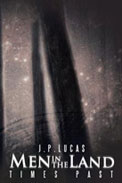"They thought he must be some kind of hibernating spirit, like the bear, who disappears in the winter and come back in the spring."

 |
Men in the Land Times Past by J. P. Lucas Trafford Publishing
book review by Omar Figueras
J. P. Lucas's Men in the Land Times Past is not just one book, but a collection of four along stories with three poems separating them. The narratives are set in the American West post the Civil War, and they possess the flavors and aromas of classic black and white Western films that used to be shown during Sunday matinees. Each story is entertaining and descriptive of this no longer existent world the author is able to capture with snapshot precision. Lucas never passes up an opportunity to utilize his gift for describing scenery, lingering on sights and sounds that only having observed and internalized the pristine Western landscape. Descriptions of the land and atmosphere are stunning and the characters that occupy this rich land are carefully and vividly described. The main characters uphold traditional values of honor and respect for each other, but Lucas's characters are human and will react unpredictably as real people would in a number of different situations.
The author does not stay the traditional course of stories from the American West. His protagonists are varied and come from all walks of life. Of the four stories, the first, Trapper White, is the longest and most intricate. Told in varying points of view, the circumstances for these characters are ever-changing, keeping the narrative drive of the story intact at moving forward at high stagecoach speed. Boyd Cobb, the third in the collection, offers a different view of the West as told through the eyes of a researcher in the wilderness being observed by the Native Americans he encounters.
Lucas's story collection uniquely capture that elusive yet familiar time in history that transpired in the land beyond the Mississippi River.